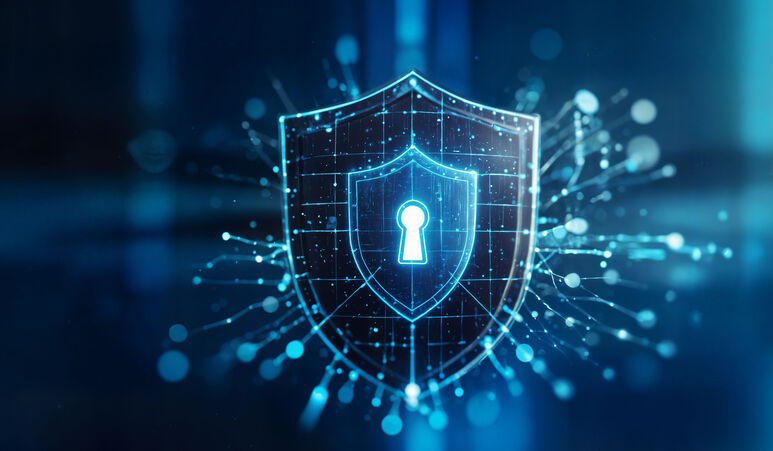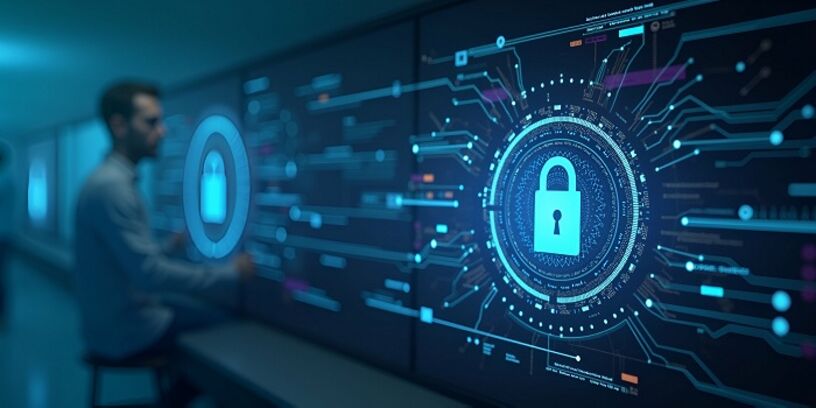Security and defence as a topic for the future
Opportunities and questions in the context of digital technologies

Security and defence as a topic for the future: opportunities and questions in the context of digital technologies
since the conflict between Russia and Ukraine at the latest, "security and defence" (SV) are no longer distant topics that only feature in the news. Both the federal and state governments have prioritised security and defence and have planned appropriate funding and launched initiatives. This also includes the topic of cyber security, which is becoming increasingly relevant. This article is intended to highlight opportunities and also address open questions to which there are no quick and easy answers.
Security and defence as topics for the future
SV is no longer just a topic for states or large corporations, but is also developing into a future field for SMEs. This is particularly evident in the area of cyber security. SMEs are increasingly being targeted by attackers, whether through ransomware, data theft or targeted sabotage. As they are heavily integrated into supply chains and increasingly utilise digital technologies such as cloud services, AI or the Internet of Things, their vulnerability is constantly growing. In addition, European regulations such as the NIS2 Directive prescribe higher security standards that also directly affect smaller companies.
In addition to the digital dimension, physical security is also becoming more of a focus. Geopolitical tensions, energy shortages and disrupted supply chains have a direct impact on the business activities of SMEs. Resilience here means not only surviving crises, but also actively preparing for them: through emergency plans, redundant supply relationships and the protection of critical production facilities. Scenarios such as blackouts, natural disasters or targeted sabotage are no longer abstract risks, but must be taken into account in business planning.
In addition, economic defence capability is also becoming a relevant aspect. SMEs are the backbone of innovation and industrial value creation, especially in areas where technologies can be used for both civil and military purposes (dual use). Politicians and society increasingly expect companies to contribute to technological sovereignty. This opens up a growth area for many companies, whether as suppliers or as developers of new security and defence technologies.
Overall, it is clear that security and defence represent both a challenge and an opportunity for SMEs. Companies that strategically anchor this topic not only ensure their resilience in times of crisis, but also open up new markets, fulfil regulatory requirements and strengthen their confidence in competition. Security is therefore becoming a crucial issue for the future, one that will determine the long-term success of many SMEs.
Opportunities and business areas
SV are not only associated with risks and obligations, but also open up a wide range of opportunities for SMEs. The growing demand for resilient structures, technological expertise and trustworthy partners means that SMEs can tap into new business areas and utilise their innovative strength in a targeted manner. Those who recognise the emerging developments at an early stage can not only protect themselves, but also actively benefit from this future market.
Dual-use technologies
- Development of sensor technology, robotics, data analysis or AI that can be used for both civil and security purposes.
- Opening up new markets through flexible, innovative solutions in niche areas.
Digital sovereignty
- National and European strategies create demand for local IT and software solutions.
- Medium-sized providers can develop specialised cybersecurity products that stand out from global standard solutions.
- Opportunity to become visible as a trustworthy European partner in security-critical areas.
Resilience & crisis preparedness as a market
- Development of solutions to stabilise supply and production chains (e.g. spare parts concepts, energy and storage technologies, resilient logistics).
- Positioning as a strategic partner that not only supplies products, but also enables resilience.
Consultancy & training
- Development of services relating to safety culture, emergency management and employee training.
- Development of training programmes and awareness campaigns as an independent business area.
- Exporting expertise beyond our own sector.
Public demand & defence budgets
- Growing government spending on security and defence is creating new markets.
- Need for reliable, innovative partners in research, development and production.
- Early positioning enables long-term participation in new value chains.
Hurdles and special features of SV
When companies consider entering the field of security and defence, they face a number of special challenges that go far beyond the usual market mechanisms. Firstly, the regulatory and political framework conditions are complex and demanding. The sector is highly regulated, authorisation procedures and export controls are complex and sometimes lengthy, and international regulations such as the European Dual-Use Regulation or US regulations such as ITAR and EAR directly influence business models. If you want to be successful here, you not only need to have technological expertise, but also a high level of legal and administrative know-how and be prepared to work closely with government institutions.
In addition, trust is a decisive success factor in this field. Government clients, partner companies and customers expect strict compliance, absolute confidentiality and proof of the highest security standards. Even minor breaches or doubts about reliability can lead to the permanent loss of business opportunities. This makes reputation a strategic asset that must be protected and actively maintained.
The technological complexity should not be underestimated either. Security technologies often require high development costs, long innovation cycles and considerable investment. For medium-sized companies in particular, the question arises as to whether they can provide the necessary resources in the long term. Co-operations, clusters or partnerships are often necessary in order to bundle innovative strength and ensure delivery capability.
At the same time, companies operate in a field of tension between international markets and national interests. Security and defence are globally intertwined, but sales opportunities are limited by export restrictions and national strategies. Dependencies on suppliers outside Europe can also lead to strategic risks if supply chains are interrupted in times of crisis.
Finally, the long-term nature of such commitments is a challenge. Projects in this area often extend over many years or decades, while budgets and political priorities can change in comparatively short cycles. For SMEs, this means enduring a certain degree of planning uncertainty and yet having the strategic patience to be able to deliver reliably over long periods of time. All in all, it is clear that entering the field of security and defence requires far more than technological strength. And one important question must always be considered: What are the values behind a potential involvement in the field of SV?
Ethics and responsibility in the dialogue between business, science and politics
Dealing with ethical issues in the field of SV is of central importance for companies considering entering this sector. Unlike in many other industries, this is not just about technological performance and economic viability, but also about the social dimension of their own actions. Products or services that are used in security or defence-related contexts can have a direct impact on human lives, international conflicts and social stability. This means that any involvement in this field inevitably touches on fundamental moral issues: Which technologies should be developed? Where is the boundary between civilian and military use? And to what extent is a company jointly responsible for the consequences of its actions?
These questions are even more sensitive for SMEs, which are often closely integrated into regional structures and maintain a special relationship of trust with employees, partners and customers. A lack of an ethical compass or a lack of transparency can quickly lead to criticism from employees, investors or the public. Conversely, a clear attitude that makes values and responsibility visible can make an important contribution to a company's reputation and even act as a competitive differentiator.
This is precisely why the dialogue between business, science and politics is indispensable. Business contributes technological expertise and innovative strength, while science is able to reflect on developments from a neutral, analytical perspective and highlight normative principles. Politics, in turn, sets the framework conditions, formulates social goals and defines limits for the use of certain technologies. Only through this exchange can viable guidelines emerge that enable innovation without ignoring ethical concerns.
For companies, this means that dealing with ethics must not be seen as an afterthought, but must be an integral part of their strategic orientation. Continuous dialogue about responsibility and boundaries is not only a protection against reputational risks, but also an opportunity to actively participate in shaping a responsible security and defence sector.
Counselling services and initiatives in Baden-Württemberg
In Baden-Württemberg, there are now several consulting services and initiatives that deal with security, cyber security and defence; mainly for companies, especially SMEs. Some offers are directly geared towards defence/armament issues, others are more focused on related fields such as cyber/IT security or legal and organisational framework conditions.
Here is an overview:
1. Consultancy services offered by the Cybersecurity Agency Baden-Württemberg (CSBW)
The CSBW offers additional support and advisory services, e.g. materials on prevention, factsheets, awareness-raising and, in an emergency, "Cyber First Aid BW". The latter is intended for companies, authorities or local authorities that have already been victims of a cyber attack or have a suspicion.
2. IHK consultations & information events
The chambers of industry and commerce in Baden-Württemberg offer events and information workshops on topics such as defence contracts, becoming a supplier, etc. via their regional advice centres. They advise companies on how to prepare for contract award procedures and what legal requirements exist. Example: "Security and defence contracts" event organised by the Stuttgart Region Chamber of Industry and Commerce.
3. Political forums & round table on security and defence
The state of Baden-Württemberg initiates committees and dialogue formats in which companies, science, the state and the military come together to discuss topics relating to security and defence. These can be a good opportunity to establish networks and find out about requirements, opportunities and expectations in this area.

